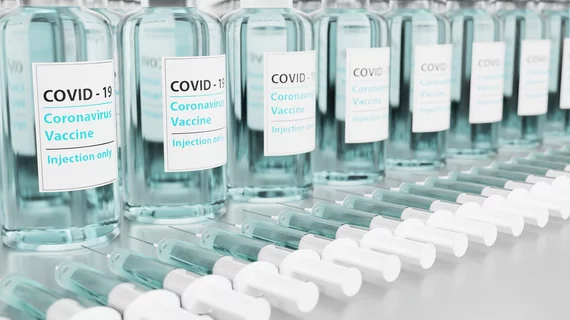Cardiac MRI scans offer new insight into COVID vaccine-related myocarditis
New research published this week uses images obtained via cardiac MRI to shed light on the effects of COVID vaccine-related myocarditis.
The research, published Tuesday in Radiology, revealed that although the injury patterns of vaccine-associated heart inflammation look similar to other causes of the inflammatory condition they tend to be less severe. Researchers hope their findings may push some individuals to seek out vaccinations who might not have otherwise.
“We know that the risk of myocarditis following COVID-19 vaccination is very low. However, there is very limited data on the extent of injury in the heart in comparison to other causes of myocarditis,” explained cardiac radiologist Kate Hanneman, MD, at the University Health Network, University of Toronto.
The work of Hanneman and her colleagues centered on the cardiac MRI scans of 92 patients between 2019 and 2021. The patients were separated into three categories: myocarditis following COVID vaccination, myocarditis following COVID illness, and myocarditis not associated with COVID vaccination or illness.
Out of those patients, 22% experienced myocarditis after receiving their vaccine, 11% were diagnosed after contracting COVID, and 66% had myocarditis that was not related to the vaccine or the virus.
The patients who were diagnosed with myocarditis after getting vaccinated against COVID tended to be younger (mean age of 31) and male. Every patient who experienced vaccine-associated heart inflammation reported an onset of chest pain 1-7 days after inoculation, and 14 of those patients were admitted to the hospital.
Although the troponin levels of those who were admitted to the hospital after vaccination were elevated on arrival, they had a significant decrease by the time patients were sent home (the average hospital stay was 3 days). On short term follow-up, the vaccine-related myocarditis and its symptoms had resolved in every case.
The doctors noted that on MRI images the vaccine-related myocarditis tended to be less severe and displayed less functional impairment compared to the other two groups. In addition, patients with COVID-associated inflammation exhibited worse injury patterns.
“These results tell us that myocarditis following COVID-19 vaccination tends to be relatively mild and resolves quickly,” Hanneman said. “Not only is myocarditis following COVID-19 vaccination very rare, it also tends to be less severe than myocarditis following SARS-CoV-2 infection.”
The results of this study could help to reassure anyone who is hesitant to be vaccinated against COVID that the complications are rare and should not prevent someone from being immunized, as the effects of COVID are statistically more severe, the doctors suggested.

